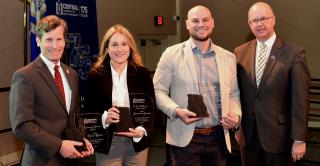
Mission
The mission of the CCSU MFT Program is to provide quality training in MFT education that promotes entry-level competence at the point of graduation. To accomplish this end, the program is committed to advancing and disseminating the Metaframeworks paradigm as a valued systemic basis for teaching and practicing marriage and family therapy, promoting culturally-informed, ethical and respectful systemic mental health practice, and encouraging leadership in the MFT field among our students, faculty, and graduates.
Student Learning Outcomes
Program Goal #1:Students will develop competence in the delivery of MFT services, including proficiency in: (1) applying systems thinking in case formulation, (2) utilizing systemic models and interventions, (3) utilizing findings of MFT research to inform clinical practice and (4) Self-reflection and self-improvement as therapists. |
SLO #1: Students will become knowledgeable in the major schools of marriage and family therapy; SLO #2: Students will develop proficiency in practice of systemically oriented therapy approaches to be applied in their clinical work with individuals, families and communities. SLO #3: Students will become knowledgeable consumers of research and evidence-based clinical practice. SLO #4: Students will demonstrate self-awareness of their own social location (i.e., internal and relational) and identify biases that inform their clinical practice. Based on this self-awareness, students will demonstrate the ability to self-correct or be open to supervisory and peer feedback. |
Program Goal #2:Students will develop competency in utilizing the integrative Metaframeworks1 paradigm in assessment, treatment planning and application of systemic models of marital and family therapy. |
SLO #5: Students will demonstrate the ability to assess a client system's resources and constraints through the “lenses” of the 6 core Metaframeworks domains (i.e., Organization, Sequences, Development, Multicultural, Gender and Internal Family System), select intervention strategies that are appropriate and aligned with the removal of identified constraints, and implement interventions based on their unique Metaframeworks assessment. |
Program Goal #3:Students will develop an understanding of and identify ethical issues that arise in academic and clinical practice based on the AAMFT Code of Ethics and state and federal laws applicable to the practice of marital and family therapy. |
SLO #6: Students will demonstrate the ability to recognize ethical dilemmas in professional practice, apply relevant AAMFT Code of Ethics and models of ethical decision making when ethical issues emerge. |
Program Goal #4:Students will develop cultural competence in Marital and Family Therapy practice. |
SLO #7: Students will demonstrate an awareness of and respect for cultural differences among clients and their contexts as defined in the program's Metaframeworks Multicultural domain. |




.png)